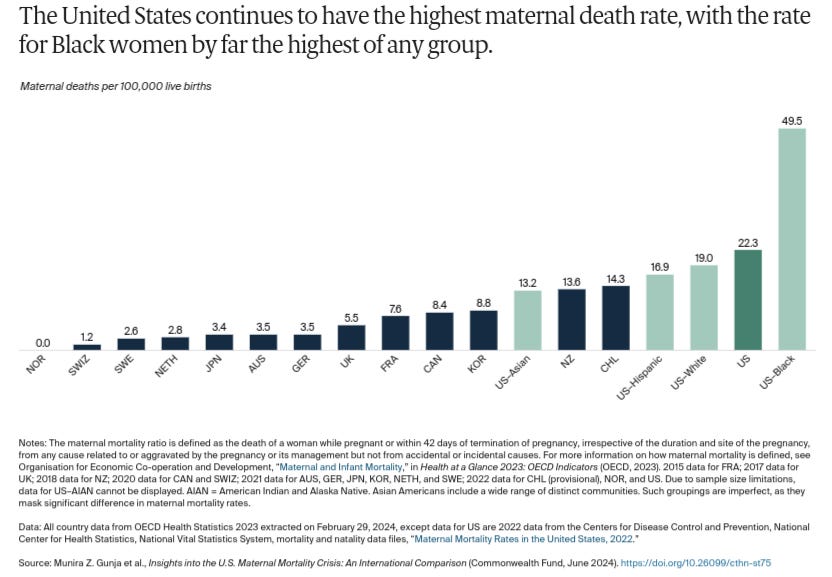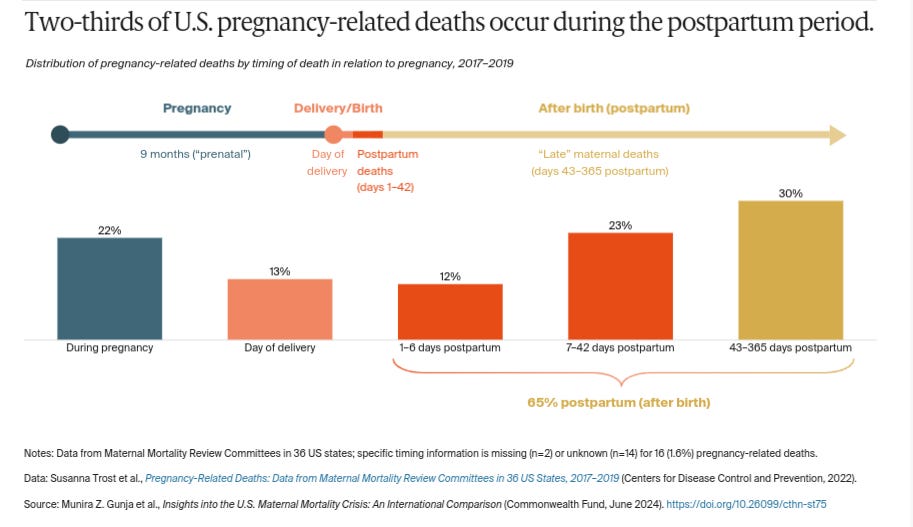A Good Day To Advocate for Better Healthcare
If there are subjects you’d like to see or improvements made, please let me know using the comment button below. I received a note from a professor friend of mine this morning, Angela, who asked that we cover insurance denials. I will begin working on that shortly.
Videos of these newsletters appear on Youtube on this channel. They are on hold until early June.
Contraception
The Senate plans to vote soon on legislation to protect access to contraception.
The bill, called the Right to Contraception Act, S.4381 — 118th Congress (2023-2024) would codify the right to contraception in federal law. The legislation was first introduced in the aftermath of the Supreme Court's move to strike down the federal right to abortion in 2022, which prompted concerns that birth control could be next. NB Unlikely to pass in the House. At this link you can see how your senators voted.
ACTION
Call your senators and let them know how important this is to you. You can find their contact info here, https://www.usa.gov/elected-officials
Contraception Policy Matters
Finland offers contraception at no cost. The number of teenage abortions in Finland fell by 66% between 2000 and 2023, its public health institute THL said on Monday, attributing the reduction to the offer of free contraception to adolescents and compulsory sex education in schools. Finland also passed a law in 2022 liberalizing abortion, at a time of deep divisions over abortion rights in Europe and court rulings in the U.S. that restricted access to terminations of unwanted pregnancies for millions of people there. (Reuters)
If you were concerned about limiting abortions contraception matters.
But in the US The Policy is Pointing Backwards
Republican lawmakers in Missouri blocked a bill to widen access to birth-control pills by falsely claiming they induce abortions. An antiabortion group in Louisiana killed legislation to enshrine a right to birth control by inaccurately equating emergency contraception with abortion drugs. An Idaho think tank focused on “biblical activism” is pushing state legislators to ban access to emergency contraception and intrauterine devices (IUDs) by mislabeling them as “abortifacients.” Since the Supreme Court overturned the right to abortion two years ago, far-right conservatives have been trying to curtail birth-control access by sowing misinformation about how various methods work to prevent pregnancy, even as Republican leaders scramble to reassure voters they have no intention of restricting the right to contraception, which polls show the vast majority of Americans favor. (Washington Post)
Maternal Mortality
The Commonwealth Fund has released a new study on maternal mortality in the US. The United States continues to have the highest rate of maternal deaths of any high-income nation, despite a decline since the COVID-19 pandemic. And within the U.S., the rate is by far the highest for Black women. Most of these deaths — over 80 percent — are likely preventable.1 (As an aside, footnotes in this article are from the study)
In 2022 there were approximately 22 maternal deaths for every 100,000 live births in the United States — far above rates for other high-income countries. U.S. maternal mortality is lowest for Asian American women and highest for Black women.
The chart above compares US maternal mortality between countries and indicates the rates for women in the US, by race.
US average, 22.2/100,000 live births;
US Asian, 13.2/100,000 live births,
US Hispanic, 16.9/100,000 live births;
US White, 19/100,000 live births;
and US Black, 49.5/100,000 live births.
The U.S. is the country with the highest rate of maternal deaths of any high-income nation analyzed. In comparison, the three countries with the lowest rates are Sweden, with nearly three deaths for every 100,000 births, Switzerland, with one, and Norway, with zero. If you’re curious here is a link to a table of the data by country.
Nearly two of three maternal deaths in the U.S. occur during the postpartum period, . Compared to women in the other countries studied, U.S. women are the least likely to have supports such as home visits and guaranteed paid leave during this critical time.
The majority of deaths in the U.S. occur in the postpartum period, from one day after giving birth to a full year later. In the first week postpartum, severe bleeding, high blood pressure, and infection are the most common contributors to maternal deaths, while cardiomyopathy is the leading cause of late deaths.12
Still, more than one of five deaths occur during pregnancy itself, with heart conditions and stroke the leading causes.
Most of these deaths — over 80 percent — are likely preventable 1.
The U.S. has one of the lowest overall supply of midwives and ob-gyns — 16 providers per thousand live births. Nearly 7 million women in the U.S. currently live in counties where there are no hospitals or birth centers offering obstetric care and no obstetric providers, and the shortage is expected to only get worse in coming years.16
Regular visits by a healthcare worker are common in other countries post partum. Not so in the US. Some states Medicaid programs cover some, others do not, private insurance may or may not cover it.
Moreover, 8 million women of reproductive age in the US HAVE NO HEALTH Insurance.
The U.S. stands alone among its peers as the only high-income country where there is no federally mandated paid leave policy so many women cannot afford the time away from work when needed.
Summary
US maternal mortality is a shameful disgrace.
Increased visits with healthcare workers would help
Having enough obgyns and midwives would help
Paid time off would help.
If women were allowed to have full reproductive rights nationwide, then 21 states wouldn’t have a problem getting new doctors coming to their state as obgyns.
If everyone had health insurance then those 8 million women of child bearing age would have access to a doctor.
If everyone had health insurance then there could be a chance for all those women to be seen and perhaps their lives would be saved.
If we had a federal paid time off policy to support families after the birth of a child, that would help women and families.
Let’s let Congress know they have work to do because women’s lives matter.
ACTION
Contact info for your Member of Congress and Senators is here, https://www.usa.gov/elected-officials.
Let’s let them know the sorry state of maternal mortality and what can fix it. Universal healthcare - like HR 3421 - so every woman can go to the doctor, passing the Women’s Health Protection Act to make abortion a national right again so doctors will not be afraid to train to be obgyns in every state, and a federal paid time off policy that supports new families.
Alternatively you can text SIGN PARUVB to 50409 on your cell phone to send them this message, using RESISTBOT.
“I am your constituent and I just learned and want you to know about the sorry state of maternal mortality in the US. Our peer industrialized countries do not have near the problem we do. In fact, some of them have nearly NO MATERNAL DEATHS.
There is a link to a study by the Commonwealth Fund released this week at the bottom of this email.
There are multiple problems - not enough healthcare insurance for 8 million women who can have children, not enough visits with healthcare professionals - often because of lack of insurance, insurance not covering all the visits or the need to work. There is also a problem with doctors fearing to be obgyns in 21 states where abortion is nearly illegal.
Here is what you can do
Enact HR 3421 - Universal Single Payer healthcare so women can go to the doctor;
Enact the Women’s Health Protection Act so doctors are not afraid to treat women nationwide
Enact a Federal Paid Time Off policy to support new families so women can take the time and go to the doctor.
Thank you.
Here is the link to the Commonwealth Fund Study - https://www.commonwealthfund.org/publications/issue-briefs/2024/jun/insights-us-maternal-mortality-crisis-international-comparison#:~:text=Recent%20Maternal%20Mortality%20Trends,deaths%20per%20100%2C000%20live%20births. me.”
Resources
Find My Elected Officials
Contact State and Federal Representatives - phone and email
Healthcare Advocacy (Us) Website
Our Newsletter resources including reproductive healthcare - Healthcare Advocacy Reading List
Important Healthcare Resources
League of Women Voters Healthcare Reform Toolkit
Organizations to Contact
National Nurses United Medicare4All
Physicians for a National Health Program
One Payer States
Healthcare Now
Reproductive Health
NARAL - Pro Choice America
Charley. chatbot abortion resource - make sure to use a secure incognito browser if you live in a state that has banned abortion
Planned Parenthood
Miscarriage and Abortion Hotline has references about where to procure abortion medications. They also assist women in the process of self managed abortion or miscarriage by phone or text and will respond in an hour. Details and hours of operation at their website.
United State of Women Reproductive health page (bottom of the page) has important resources such as medical support, access to Telehealth, prescriptions by mail, and legal support references.
Practice careful communications - The Digital Defense Fund has a number of tips to keep texts, calls, and internet use private. Here is their site.
If you need financial help with an abortion try abortionfunds.org
Claims Denials and Appeals & What to Do
Appeal a Healthcare Decision
Appeal/Negotiate a Hospital Bill
Disinformation Management
Cybersecurity Infrastructure Security Agency
Save Democracy
Chop Wood, Carry Water by Jessica Cravens
RESISTBOT
Link to the RESISTBOT site to learn more
Link to Chop Wood, Carry Water RESISTBOT write up
Learn About Healthcare Policy
The Kaiser Family Foundation has put together an online course about healthcare policy. It is called Health Policy 101. It is free and here is the link to their course page. I will keep this note here for a few days.
Thanks for reading Healthcare Advocacy! Subscribe for free to receive new posts







Sounds like Finland is dealing with reality rather than the prudish morality of other countries including the US.
Even though contraception is not a problem for me any longer, I revolt against the idea that it could be considered a legal rather than a personal issue for anyone. Most of us have gotten over the idea that sex is for procreation only. Contraception should be a private choice. If there is NO law regarding contraception, we are each free to chose after our own conscience.
Could we get an updated resistbot code? 😃 Thanks for all your work on this!!